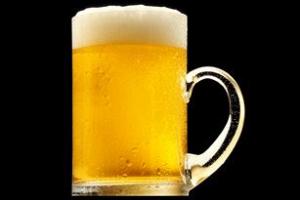A new industry study says access to legal marijuana is having a negative impact on beer sales. That's bad news for the brewing industry, but good news from a public health perspective.

The "magnitude of the underperformance has increased notably" as beer volumes have dropped more than 2% year-to-date in the trio of pot states, with big mainstream brewers like MillerCoors and Anheuser-Busch InBev seeing the biggest declines, with volumes down 4.4%. Craft beers have done a little better, but are down, too, seeing a 2.2% drop.
"While [marijuana] retail sales opened up in these markets at different points of time, with all three of these states now having fully implemented a retail infrastructure, the underperformance of beer in these markets has worsened over the course of 2016," wrote Vivien Azer, Cowen and Company's managing director and senior research analyst.
That's not exactly a shock, Azer wrote, since government survey data has shown "consistent growth in cannabis incidence among 18-25 year olds" in those three states at the same time that age group has seen declines "in alcohol incidence (in terms of past month use)." The change is most evident in Denver, one of the centers of the legal pot culture, where beer volumes have dropped 6.4%.
Numbers like these, if they continue, should soothe the concerns of public health advocates and academics worried that legal marijuana could complement alcohol use instead of substitute for it. Would legal pot mean more drinking or less? If legal pot meant increased alcohol consumption, with all its dangers, that would be a bad thing from a public health perspective. But if legal pot leads to less alcohol consumption, such problems can be alleviated.
And this bad news for the brewing industry suggests it does. It's not the only evidence suggesting a substitution effect, either.
In a review in the Journal of Policy Analysis and Management, Montana State University economist D. Mark Anderson and University of Colorado economist Daniel Rees reported that "studies based on clearly defined natural experiments generally support the hypothesis that marijuana and alcohol are substitutes."
They pointed to one study that found a higher drinking age increases teen pot consumption and that pot smoking drops off sharply at 21, when alcohol becomes legal, "suggesting that young adults treat alcohol and marijuana as substitutes."
Maybe we need to start talking about the public health benefits of marijuana legalization.
Comments
weed vs alc lobbying
Time to send reminders of this to President-Elect Trump who claimed to have learned from the example of his older brother who was an alcoholic and died at age 43.
Sonuds like BS? IT IS.
Coffee ,wine,good food,BEER,
Go great with cannabis , the pairings is the thing.
Pepole writing or doing studies need at least, some, litttle experience and some tiny, knowledge of the subject BEFORE the expound on things of which they know NOTHING.
I have seen the idiots printing stuff about cannabis OVERDOSE ! WHAT there is NO SUCH THING!
fake studies and fake news is a old deal that DIED with Clintons BS campaign.LOL.
so stop the BS.
Pot vs. other "drugs"
Alcohol and painkillers, both legal everywhere (as long as you have a scrip for the painkillers) are some of the most dangerous drugs on the planet, causing thousands of deaths, millions of healthcare expenses, and societal problems of all sorts. And this doesn't even include tobacco. Of course these international corporations know marijuana will cut into their profits. But these people, if you can call them that, care more about money than the health and well being of their customers. It's too bad DC operates on lobbyist money instead of rational thought or compassion. It makes me sick.
In reply to Pot vs. other "drugs" by Mr Boompi (not verified)
it makes me sick too. as do
it makes me sick too. as do americans in general, who continue to support politicians and political parties that are corrupt, deluded, bigoted, and hypocritical. it's quite a discouraging dystopian situation.
cannabinoid system in the effects of alcohol
Involvement of the endogenous cannabinoid system in the effects of alcohol in the mesolimbic reward circuit: electrophysiological evidence in vivo.
Perra S, et al., Psychopharmacology (Berl). 2005 Dec;183(3):368-77.
RATIONALE: Several lines of evidence indicate that the endogenous cannabinoid system is involved in the pharmacological and behavioural effects of alcohol. The mesolimbic dopaminergic (DA) system and the nucleus accumbens (NAc) process rewarding properties of drugs of abuse, including alcohol and cannabinoids, whereas endocannabinoids in these regions modulate synaptic function and mediate short- and long-term forms of synaptic plasticity.
OBJECTIVES: The present study was designed to investigate the contribution of the endogenous cannabinoid system in alcohol electrophysiological effects in the mesolimbic reward circuit.
METHODS: We utilized extracellular single cell recordings from ventral tegmental area (VTA) DA and NAc neurons in anesthetized rats. DA neurons were antidromically identified as projecting to the shell of NAc, whereas NAc putative medium spiny neurons were identified by their evoked responses to basolateral amygdala (BLA) stimulation.
RESULTS: Alcohol stimulated firing rate of VTA DA neurons and inhibited BLA-evoked NAc neuron spiking responses. The cannabinoid type-1 receptor (CB1) antagonist rimonabant (SR141716A) fully antagonized alcohol effect in both regions.
In the NAc, either inhibition of the major catabolic enzyme of the endocannabinoid anandamide, the fatty-acid amyd hydrolase, with URB597 or a pretreatment with the CB1 receptor agonist WIN55212-2 significantly depressed alcohol-induced effects in the NAc.
CONCLUSIONS: These results corroborate the notion of the involvement of endocannabinoids and their receptors in the actions of alcohol and highlight the endocannabinoid system as a valuable target in the therapy for alcoholism.
- B.B. Brodie Department of Neuroscience, University of Cagliari, Cittadella Universitaria di Monserrato, 09042 Monserrato, CA, Italy.
* https://www.ncbi.nlm.nih.gov/pubmed/16228194
Add new comment